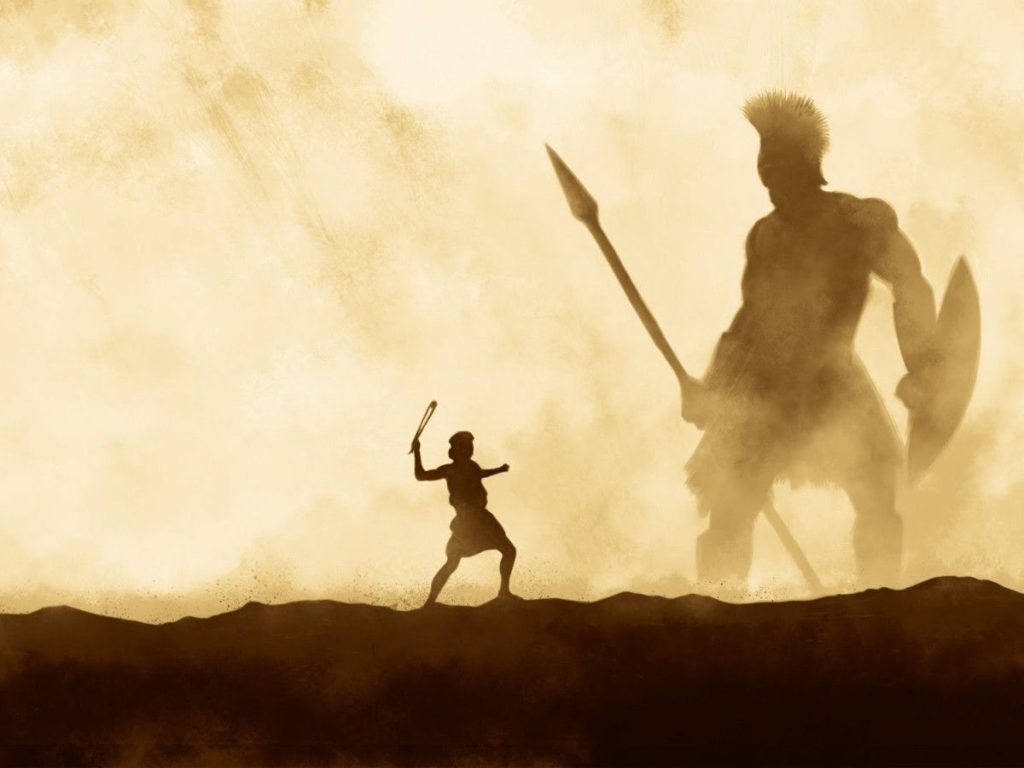
The sun was rising over the hills of Bethlehem as David emerged from his family’s small stone house. As he walked to tend his sheep, he could feel the morning chill on his skin and the dew on the grass under his feet. As he watched over his flock, he practiced his aim with his sling, launching pebbles at nearby trees and rocks with impressive accuracy. Unbeknownst to him, this daily ritual with his sling would prove rather useful later on.
One day, David’s peaceful routine was interrupted when news arrived of a great challenge facing his people. The Philistines, their long-standing enemies, had sent their champion Goliath to challenge the Israelites to send a warrior to face him in single combat. For forty days, the giant taunted the Israelite army, and no one had the courage to face him.
David could not bear to see his people cower before their enemy, and he offered to fight Goliath himself. King Saul, impressed by David’s bravery and determination, agreed to let him face the giant. David stepped onto the field, holding his sling and a single smooth stone. As Goliath roared in laughter, David aimed his sling and launched the stone, hitting Goliath squarely in the forehead, killing him instantly.
The Israelite army erupted in cheers and admiration for the young shepherd boy who had defeated their greatest enemy. David’s reputation grew, and he quickly rose through the ranks of the army, earning the favor of King Saul and the admiration of the people. But Saul’s jealousy of David’s success eventually led to his downfall, and David was forced to flee for his life.
Staying Strong
Despite the challenges and setbacks he faced, David never lost his faith or his determination to serve his people. As a military leader, David was known for his tactical brilliance and bravery in battle. He gathered a group of loyal followers and continued to fight for the Israelites, leading them to many victories against their enemies. David expanded the borders of Israel and unified the tribes, eventually establishing Jerusalem as his capital city.
Throughout his life, David remained a complex and fascinating figure, embodying both the best and worst aspects of human nature. His military successes and his devotion to God continue to inspire admiration and reverence in Jewish and Christian traditions, while his flaws serve as a reminder of the importance of accountability and integrity in leadership.
Every Leader Fails
But David’s life was not without its share of hardships and mistakes. He fell in love with Bathsheba, the wife of one of his soldiers, and arranged for her husband to be killed in battle to cover up their affair. This act of betrayal was met with strong condemnation, both then and now, and serves as a reminder of the dangers of unchecked power and desire. David faced rebellions from his own son Absalom and from other political rivals, testing his leadership and his faith.
Despite his flaws, David’s legacy has endured for thousands of years, primarily because of his religious leadership. He is revered in Jewish and Christian traditions for his deep devotion to God and his contributions to the Psalms, which express a range of emotions from joy and thankfulness to despair and sorrow. His commitment to God and his unwavering faith in the face of adversity have served as a model for believers throughout history.
Take it Home
What do I mean by take it home? Take it home, is another way of saying, “what did we learn from this?” How can we use the lessons learned and apply it to our own life and within our family.
David’s life also serves as a reminder of the complexities of human nature and the importance of accountability in leadership. His mistakes and failures serve as cautionary tales, while his unwavering faith and commitment to his people inspire us to strive for greatness and lead with integrity and compassion.
In summary, King David’s life and legacy continue to resonate with people today, serving as a model of the warrior culture in ancient Israel and as a symbol of faith and leadership for generations to come. His story is a testament to the enduring power of religious devotion and the complexities of human nature.
A leader is one who knows the way, goes the way, and shows the way.
John C. Maxwell
It is better to lead from behind and to put others in front, especially when you celebrate victory when nice things occur. You take the front line when there is danger. Then people will appreciate your leadership.
Nelson Mandela
Leave a Reply